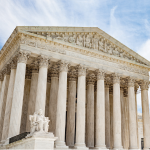WASHINGTON (Reuters)—The U.S. Supreme Court preserved President Barack Obama’s signature healthcare law on Thursday, upholding crucial tax subsidies while turning aside a conservative legal challenge that could have doomed the law.
“After more than 50 votes in Congress to repeal or weaken this law, after a presidential election based in part on preserving or repealing this law, after multiple challenges to this law before the Supreme Court, the Affordable Care Act is here to stay,” Obama said in the White House Rose Garden.
Chief Justice John Roberts, a conservative appointed by Republican President George W. Bush, wrote in the 6-3 ruling that Congress clearly intended for the tax subsidies that help low- and moderate-income people buy private health insurance to be available in all 50 states.
The court decided that the law, widely known as Obamacare, did not restrict the subsidies to states that establish their own online health insurance exchanges.
“Congress passed the Affordable Care Act to improve health insurance markets, not to destroy them,” Roberts wrote in the court’s decision, adding that nationwide availability of the credits is required to “avoid the type of calamitous result that Congress plainly meant to avoid.”
Roberts was joined by fellow conservative Justice Anthony Kennedy and the court’s four liberal members in the majority.
It marked the second time in three years that the high court ruled against a major challenge to the law brought by conservatives. Both rulings were written by Roberts. Republicans have fought the law since its inception.
With the ruling, the current system will remain in place, with subsidies that help low- and moderate-income people buy private health insurance available in all 50 states. If the challengers had won, at least 6.4 million people in at least 34 states would have lost the subsidies whose average value is $272 per month.
“There can be no doubt that this law is working,” Obama said. “It has changed, and in some cases saved, American lives. It set this country on a smarter, stronger course.”
The decision means the subsidies will remain not just in the 13 states that have set up their own exchanges and the three states that have state-federal hybrid exchanges, but also in the 34 states that use the exchange run by the federal government.
The case centered on the tax subsidies offered under the law, passed by Obama’s fellow Democrats in Congress in 2010 over unified Republican opposition. The exchanges are online marketplaces that allow consumers to shop among competing insurance plans.
